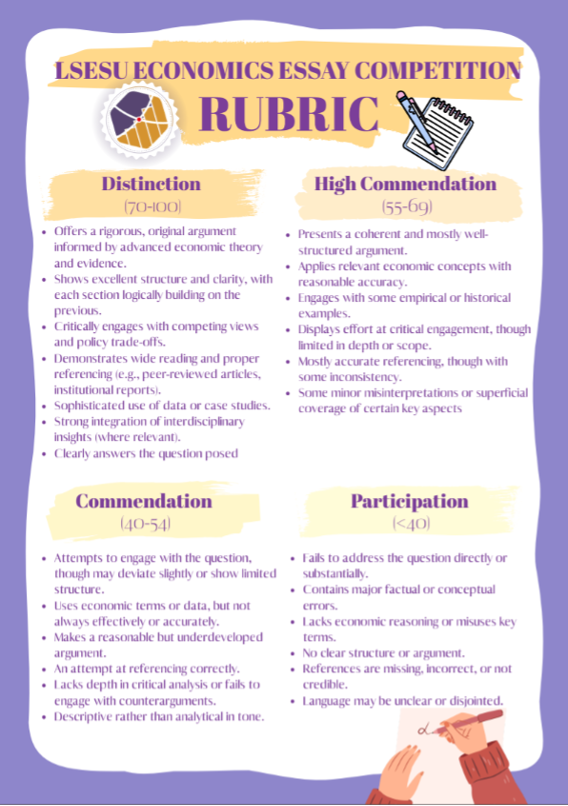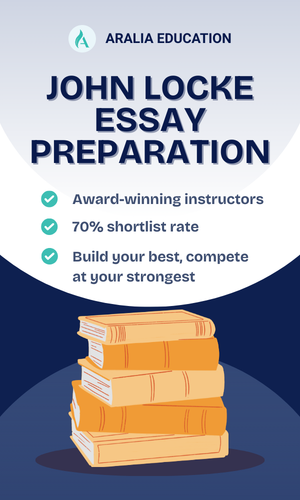What is The LSESU Essay Competition?
The LSESU Economics Society Essay Competition is hosted annually by the London School of Economics Students’ Union (LSESU) – Economics Society. It offers students the chance to write an essay responding to carefully curated questions that span political economy, macroeconomics, and the financial sector. These questions are designed by leading professors at the London School of Economics (LSE) and are meant to challenge your ability to apply economic models and frameworks to real-world issues while developing your independent analysis.
Get into Your Dream Summer Writing Program
LSESU Competition Detail
1. Who is Eligible?
The competition is open to high school students worldwide who meet one of the following criteria:
- You have just finished your second-to-last year of high school (equivalent to year 12 in the UK, typically ages 16–17).
- You have just completed your final year of high school (year 13 in the UK, typically ages 17–18).
- You are planning to start university in the 2025/26 academic year, including students who will take a gap year before university.
In short, if you are between 16 years old and the start of your university studies (including those on a gap year), you are eligible to participate in the competition.
2. Prizes
By participating in the LSESU Essay Competition, students will have the chance to earn the following prizes:
- Top 3 for Each Question: A certificate signed by the President of the LSESU Economics Society and a named professor.
- 1st place for Each Question: A £50 Amazon gift card.
- Overall 1st Place: A certificate signed by the President of the LSESU Economics Society and a £100 Amazon gift card.
- Top Offer Holder: A certificate signed by the President of the LSESU Economics Society and the Head of the LSE Department of Economics, along with a £100 Amazon gift card.
3. Timelines and Important Dates
If you’re planning to join the LSESU Essay Competition, be sure to mark these dates:
- Submission Deadline: Monday, September 1 at 23:59 (GMT+1)
This is the final day to submit your essay, so plan your research and drafting schedule accordingly. - Results Announcement: Monday, September 15
Winners will be announced on this day, so keep an eye on your email and the LSESU Economics Society’s official website.
Staying organized with these dates will ensure you have enough time to polish your essay before submission.
4. Submission Guidelines
To give yourself the best chance of winning, it’s important to carefully follow the submission guidelines below:
- Word Limit: 1,500 words (excluding references).
- Submission Method: Upload your essay via the Google Form linked on the official competition website (link below).
- Submission Rules: Each participant may submit only one essay in response to one of the five competition questions. Plagiarism and AI-generated content are strictly prohibited, and proper referencing is essential. All essays will be screened, and any entry violating these rules will be immediately disqualified.
- Submission Deadline: Monday, 1st September 2025 at 23:59 (GMT+1). Late submissions will not be accepted under any circumstances.
Once your essay is ready, submit it via the Google Form here.
5. Grading Criteria
Your essay will be evaluated based on the following criteria:
- Argument and Originality: Is your argument clear, logical, and innovative? Does it move beyond textbook answers to provide original insight?
- Use of Economic Theory: Are economic models, frameworks, or concepts applied accurately and effectively to strengthen your argument?
- Evidence and Examples: Are your claims backed by credible data, empirical studies, historical examples, or relevant case studies?
- Critical Analysis: Does your essay thoughtfully address counterarguments, limitations, trade-offs, or alternative explanations?
- Structure and Clarity: Is your essay well-organized with a logical flow? Are your introduction and conclusion effective? Is your language clear and precise?
- Referencing and Sources: Are you using high-quality sources, such as academic papers or institutional reports? Are your references cited consistently and correctly?
- Relevance to the Question: Does your essay stay focused on the question and directly address it throughout?
Keeping these criteria in mind while planning, drafting, and editing your essay will increase your chances of standing out in the LSESU Essay Competition.
LSESU Essay Competition 2025 Questions
This year, students will have the chance to choose from five thought-provoking questions developed by leading LSE professors.
Professor Sir Christopher Pissarides:
“As AI and other automation technologies are penetrating the office, employees are loving some aspects of it and hating others. For example, they love that AI enables them to work from home one or two days a week but hate that the boss is using AI to monitor and evaluate their work. How can a modern employer balance the company’s needs with AI against the employees’ objectives and wellbeing?”
Professor Sir Tim Besley:
“Is it useful to bring social identity into economics in order to understand contemporary policy challenges?”
Professor Christopher Sandmann:
“What are the best economic predictors for armed conflict and peace?”
Professor Jane Olmstead-Rumsey:
“How will the pace and economic effects of AI adoption differ from the adoption of previous general-purpose technologies like computers, electricity, and steam power?”
Professor Ricardo Reis:
“Take a country that uses tariffs to eliminate the (large) bilateral trade deficit it has with some of its trading partners while at the same time running a large public deficit. What are the consequences of such a mix of policies on its overall current account, its composition, the exchange rate, and domestic employment?”
You will need to select one of these five questions to respond to in your essay. Choose a question that genuinely sparks your curiosity, as this will help you craft a stronger and more engaging argument.
Expert Guide to Tackling the LSESU 2025 Questions
To write a strong, well-argued essay, it’s essential first to build a solid foundation in economics and stay informed about current global issues. Here are a few steps to help you get started:
- Deepen your Background Knowledge: Read widely to understand key frameworks and theories, and how they apply to real-world challenges. This will give you the tools you need to analyze questions critically.
- Explore Academic Articles: This will help you see how economists construct rigorous arguments. Skimming the American Economic Review’s Top 20 articles from the past 100 years can provide insight into effective economic writing and analysis.
- Stay Updated on Current Economic Issues: Consider getting a free student subscription to The Economist to follow global developments, and read other reputable outlets like The Wall Street Journal and The New York Times to broaden your perspective on economic trends.
By building a strong research foundation and exposing yourself to real-world economics, you will be well-prepared to tackle the LSESU Essay Competition 2025 questions with confidence. You can work through the competition prompts using the detailed guidance provided below.
1. Professor Sir Christopher Pissarides:
Question 1: “As AI and other automation technologies are penetrating the office, employees are loving some aspects of it and hating others. For example, they love that AI enables them to work from home one or two days a week but hate that the boss is using AI to monitor and evaluate their work. How can a modern employer balance the company’s needs with AI against the employees’ objectives and wellbeing?”
To approach this question, start by understanding the tension between employers and employees regarding the use of AI in the workplace. Companies want to use AI to track productivity and cut costs, while employees value their privacy, independence, and well-being, and may feel uncomfortable if they are constantly monitored. Identifying this conflict is the first step for students in building a strong argument.
Next, you can consider what this tension means in practice. Ask yourself: How does AI monitoring affect trust between workers and employers? What are the ethical and economic trade-offs when using AI for surveillance, and how does it impact both productivity and employee morale? Exploring these questions will help you understand the bigger picture.
Finally, connect your discussion to concepts in labor economics, such as incentives, trust, and the dynamics of the modern workplace. Consider practical solutions employers could use to balance efficiency with employee well-being, like involving employees in decision-making or implementing transparent monitoring policies to build trust. Taking this approach will help you write an essay that not only answers the question but also shows your ability to think critically about the role of AI in shaping the future of work.
2. Professor Sir Tim Besley:
Question 2: “Is it useful to bring social identity into economics in order to understand contemporary policy challenges?”
Students should begin by defining what is meant by social identity. This includes aspects such as ethnicity, religion, class, gender, and other characteristics that influence how individuals see themselves and interact with others.
After understanding social identity and its impact, you can explore how social identity affects economic behavior and decision-making. For example, people may prefer products associated with their identity group or vote in ways that reflect their social affiliations. Linking these behaviors to economics allows you to explore how identity shapes outcomes in markets and politics.
Finally, connect the concept of social identity to contemporary policy challenges. Discuss issues like political polarization, social cohesion, and redistribution of resources, demonstrating how identity economics can provide insights into these problems. Incorporating perspectives from behavioral economics and political economy will help deepen your analysis.
3. Professor Christopher Sandmann:
Question 3: “What are the best economic predictors for armed conflict and peace?”
To tackle this question, start by examining the primary theories that economists and political scientists use to explain why conflicts occur. You could explore the opportunity versus grievance theories, as well as ideas such as the resource curse and the role of weak institutions. Understanding these frameworks will help you build a strong base for your essay.
Next, focus on the specific economic and social factors that can predict conflict. For example, think about how income shocks (sudden economic downturns), ethnic fragmentation, political repression, and youth bulges can increase tensions within a country. It is also important to distinguish between short-term triggers (like a sudden price spike in food) and long-term structural causes (such as persistent inequality or weak governance) when analyzing the causes of conflict.
Also, consider peace-building by examining the strategies and conditions that help societies avoid or recover from conflict. Explore how strong institutions, economic diversification, and effective foreign aid can help stabilize countries and reduce the likelihood of future conflicts. By addressing both the causes of conflict and the factors that sustain peace, you will create a well-rounded essay that shows your ability to apply economic reasoning to real-world global challenges.
4. Professor Jane Olmstead-Rumsey:
Question 4: “How will the pace and economic effects of AI adoption differ from the adoption of previous general-purpose technologies like computers, electricity, and steam power?”
To begin, define general-purpose technologies (GPTs). GPTs are technologies like computers, electricity, and steam power that fundamentally transform economies by enabling new industries and boosting productivity across sectors. Explain why AI is considered a GPT and how it has the potential to create widespread changes in the economy. After that, compare the economic spillovers of AI with those of past GPTs. Think about how AI could affect productivity growth, employment opportunities, and wage inequality, including the possibility of wage polarization where high-skilled workers benefit more than low-skilled workers.
With this understanding of GPTs and how AI has impacted the economy, discuss key concepts such as adoption lags, skill-biased technological change, and capital complementarity. Adoption lags refer to the time it takes for a new technology to be widely used, while skill-biased technological change examines how new technologies often increase the demand for skilled workers. You can also explore how AI might require complementary investments, like new infrastructure or training, for its benefits to be fully realized. Lastly, evaluate whether AI is likely to follow historical patterns of previous technology adoption or if it could break away due to its unique characteristics.
5. Professor Ricardo Reis:
Question 5: “Take a country that uses tariffs to eliminate the (large) bilateral trade deficit it has with some of its trading partners while at the same time running a large public deficit. What are the consequences of such a mix of policies on its overall current account, its composition, the exchange rate, and domestic employment?”
To address this question, students should explore how tariffs affect trade balances. Tariffs are often used to reduce trade deficits with specific countries, but it’s important to consider whether reducing a bilateral deficit will improve the country’s overall trade balance or if imports will instead shift to other trading partners. This helps you think critically about the effectiveness of tariffs in addressing large trade deficits. Then, consider how running a large public deficit affects the economy. Explore how fiscal deficits are linked to domestic demand, capital inflows, and exchange rates.
What are the unintended consequences of using tariffs while maintaining a public deficit? You need to research this topic thoroughly to respond to the question effectively. Tariffs can lead to job losses in industries that rely on imported goods, provoke retaliatory tariffs from trading partners, and contribute to higher prices domestically (inflation). Remember to incorporate economic models and real-world examples into your essay to analyze these complex interactions.
Unlock Your Writing Potential: Students in Our Writing Competition Preparation Class Are More Likely to Secure Awards
Suggested Reading Resources
In addition to the specific guidance on how to approach each question above, the professors who designed this year’s questions have recommended readings to help you deepen your understanding of these topics.
To make it easier for you to access and navigate these materials, Aralia’s team has compiled all of the suggested resources in a document for you to explore as you prepare your essay.
Tips to Write a Good Economic Essay
Here are some tips from Aralia’s experts to help you draft a strong, competitive economics essay for the LSESU Essay Competition:
- Keep your Essay Structured and Precise: Stay within the 1,500-word limit. Before you start writing, create an essay plan with a clear structure, including an introduction that outlines your argument, a conclusion that ties your ideas together, and (sub)headings if needed to guide your reader through your analysis.
- Connect your Argument to an Economic Model, Theory, or Data Analysis Tool: Using related economics theory in your essay is a great way to strengthen your argument. Briefly introduce the model or theory and focus on how you are applying it to answer the prompt. Also, use statistics and real-world examples to support your argument, referencing a wide range of credible evidence to strengthen your analysis.
You can also refer to the grading rubric provided by the competition to understand what the judges are looking for in a winning essay.

Aligning your essay’s structure, analysis, and evidence with these expectations will help your work stand out.
Prepare Your Essay with Award-Winning Instructors at Aralia
With guidance from our experienced instructors, many Aralia students have gone on to win prizes in the LSESU Essay Competition. Our instructor, an economics professor from a top university, will help you build a strong understanding of key economic concepts and theories while guiding you in developing and refining your essay ideas. You will also receive personalized feedback to strengthen your analysis and writing. By the end of the class, you will have a polished, competitive essay ready for submission to the LSESU Essay Competition.
Further Reading:

Devising Competitive Applications for Summer Creative Writing Schools
Devising Competitive Applications for Summer Creative Writing Schools is designed to help high school students craft standout applications for top-tier creative writing summer schools. With expert guidance, you’ll refine your personal statement, polish your writing samples, and gain the confidence to apply with a competitive edge.








